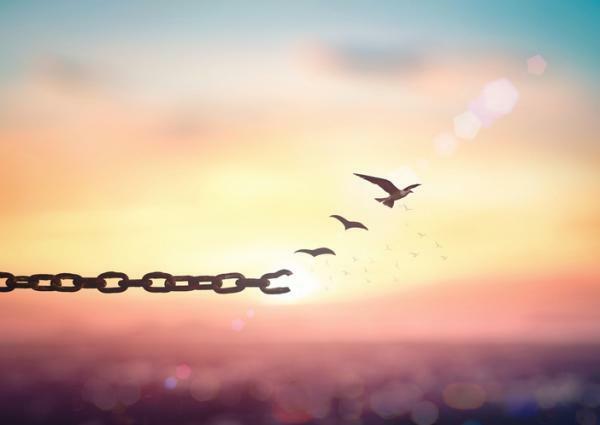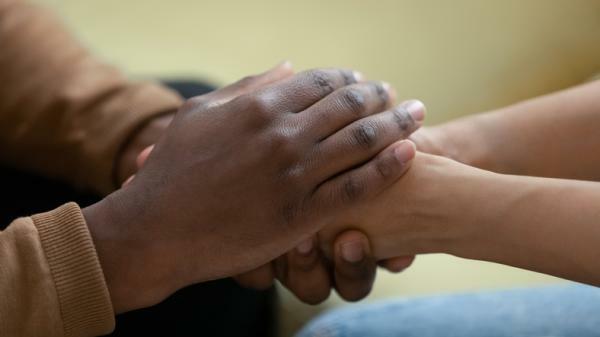
How to forgive those who offend us? How to forgive a betrayal? We have all suffered throughout our lives injustices and humiliations that have damaged us and normally, the tendency arises of wanting to make those who have done us wrong suffer, "an eye for an eye and a tooth for a tooth" who they say. However, we must bear in mind that this law acts as a Boomerang causing great harm to ourselves as well. It's not fair to yourself stagnate in resentment and revenge, as this will prevent us from moving forward.
Knowing how to forgive has multiple advantages. However, when someone has done you a lot of harm, it can be very difficult to forgive them. Therefore, with this Psychology-Online article we want to show you how to learn to forgive where you will find 18 effective tips.
Learn to forgive.
In order to learn to forgive, we must first define the meaning of forgiveness, what we mean when we say to someone “I forgive you” and the benefits of forgiveness. Forgiveness is the action of reacting to a harm that has been done to us, which implies forgetting the injustice that has happened to us, but above all, it implies a
Knowing how to forgive consists of an attitude, decision to let go of anger and resentment and let in the acceptance of the damage of the past and place the view into the future. The benefits of forgiveness are many, including the peace it generates.
How to learn to forgive?
How to learn to forgive from the heart? How to learn to forgive and forget the past? To learn to forgive, there is a set of attitudes that predispose the person to the freedom to forgive. The first tips to learn to forgive are the following:
1. to love
Conceiving love for a person who has hurt us can often be considered impossible. In order to give rise to the attitude of loving, it is necessary first of all take a distance, even if it is internally, with the person who has damaged us and only then will we be able to see it in its entirety. People are to be loved in their entirety, even when they make mistakes and a person can only live and develop fully when he is accepted as he is. Not forgiving implies that the other person does not feel accepted in their totality and with it, we destroy her identity that must be exposed in freedom.
2. Understanding
As human beings that we are, we must understand that we are all vulnerable, that we can all be weak. Forgiving implies the conviction that in every human being, behind any mistake, there is a vulnerable person with the ability to change. Forgiveness includes believing in the other person's ability to transform.
3. Generosity
Forgiveness requires generosity, since the person does not expect anything in return for your forgiveness.
4. Modesty
Learning to forgive involves being humble. In forgiveness, a "moral superiority" is not sought, it does not seek to humiliate the aggressor or dominate him morally. With this, they must avoid reproaches, since these imply the impossibility of forgiving.
If you wonder why is it so difficult to forgive, in this article you will find the reasons.
How to forgive someone.
Perhaps you wonder how to forgive a betrayal or how to forgive an infidelity. We have seen that there are attitudes that can bring us closer to forgiving from the heart and now we would like to provide a set of advice on how to forgive a person in particular, for example, how to learn to forgive your partner, how to forgive a friend, how to forgive a mother or how to forgive someone who has hurt you.
1. Recognize the damage
There are many people who, when they have been hurt by someone important to them, hide their pain so as not to feel it, to protect themselves. These people repress their freedom to be themselves, because they do not express the pain they have felt when someone has hurt them for being who they are. We must understand that it is normal that when someone hurts us, it hurts us emotionally and only the act of face suffering head-on, may lead us to be good with ourselves.
2. Get rid of resentment
Resentment gives rise to the need for revenge, and revenge causes the wounds that have been inflicted on us to remain open. If we enter a vicious cycle of resentment and revenge, our wounds will not be able to heal and we will continue to maintain the discomfort.
3. Remember the past
Thinking that time will heal our wounds can become our great evil. Not because a person over time stops crying over an event and stops evoking it in her memory so constantly, does she mean that she has forgiven. We cannot perpetuate the damage. Forgiveness does not imply “making a clean slate”, but rather requires acknowledge injustice, confront it and to the extent possible, repair the damage caused. Our memory cannot be at peace, if no matter how much time has passed when remembering the event, they are born in us feelings of resentment.
4. See the whole person
Forgiveness is inconceivable if we conceive of the person who has harmed us solely by that action. People we are more than our mistakes and all human beings are greater than our guilt. Therefore, to forgive it is necessary to be able to see the other in his totality as a human being.
5. Believe in the other
As we pointed out in the attitudes to be able to forgive, if we do not trust the capacity of the other person to recognize his mistakes and transform himself, we are preventing us from being able to forgive him by thinking that his actions cannot change.
6. Regret is not a condition
Although it is appropriate for the aggressor to show regret for the acts that have harmed us, to forgive the declaration of the guilt of the other is not necessaryWe must recognize that people on many occasions, even when they do wrong, may have blockages or defense mechanisms that prevent them from being able to recognize their guilt.
7. Learn to listen
On many occasions, when someone hurts us, we close ourselves and do not open our eyes and hearts to what they want to tell us. In order to forgive we must know both the motives and the reasons for our anger, as well as the arguments of the other. It is important to place ourselves in the other person and perhaps from the understanding of the other and empathy, we can forgive him. In this article you will find how to practice empathy.
8. Do not expect anything in return
As we pointed out in the attitudes to forgive, a good advice is not to expect anything in exchange for your forgiveness. A sincere forgiveness does not wait for a condition.

One of the great challenges we face as human beings is to forgive ourselves. Forgive yourself it can be much more complex than forgive another person, since you find yourself alone in the face of many emotions. How can we forgive ourselves? First, understanding that making mistakes is sometimes inevitable, and learning to forgive yourself is essential to learning from those mistakes. There are certain methods to work forgiveness and self-forgiveness such as forgiveness therapy or self-forgiveness letter. One author who has written about forgiving yourself is Louise Hay, a writer of various self help books. Tips for forgiving yourself are as follows:
1. Respect yourself as a human being
Sometimes it seems that we tend to forget that we are human and as human beings we are wrong, we make mistakes and fail and not because of that, we should devalue ourselves.
2. Look for the bright side
Making mistakes is a natural condition of people and absolutely necessary to evolve as human beings. Allow yourself to make mistakes and conceive the idea that your mistakes will allow you learn from them and so you can improve.
3. Take responsibility
It is essential to forgive oneself to be aware of our responsibility for the facts. We must be aware of the part of responsibility that concerns us in front of the event, since if we do not conceive our fault, we will not be able to forgive ourselves, in the same way that if we think we have a responsibility that is not, we can unjustly punish ourselves for a fault that does not concerns.
4. Examine your emotions
We must recognize the emotions, feelings and / or thoughts that have led us to act as we have acted. A bad act can be caused by feelings of insecurity, out of fear or envy, for example, and if we do not understand the origin of our actions and we understand ourselves, we cannot forgive ourselves.
5. Do not punish yourself
Self-punishment will only lead us to blockade, preventing us from moving forward. Continually beating ourselves up for mistakes prevents us from seeing what we can do to prevent them from happening again. By punishing ourselves we put a brake on our own evolution. The best strategy is apply self pity.
6. Overcoming
Once we have understood why we made the mistake, what emotions and thoughts led us to it, have accepted what we committed and have taken responsibility for it, we must understand that it is not our mistakes that define usBut the way we deal with them is.

This article is merely informative, in Psychology-Online we do not have the power to make a diagnosis or recommend a treatment. We invite you to go to a psychologist to treat your particular case.
If you want to read more articles similar to How to learn to forgive: tips, we recommend that you enter our category of Personal growth and self-help.
Bibliography
- Burggraf, J. (2003). Learn to forgive. In presentation on the Family Congress, University of La Sabana-Aspaen-Corpaf, Bogotá.
- Prieto-Ursúa, M., & Echegoyen, I. (2015). Self-forgiveness, self-acceptance, or intrapersonal restoration? Open questions in the psychology of forgiveness. Psychologist Papers, 36 (3), 230-237.
- Zalles, C., & Zavarce, P. (2004). Forgiveness: a liberating experience that leads to well-being. The Strengths of the Venezuelan. Venezuela. Editorial Alfa. 1st Edition. pp, 109-23.


